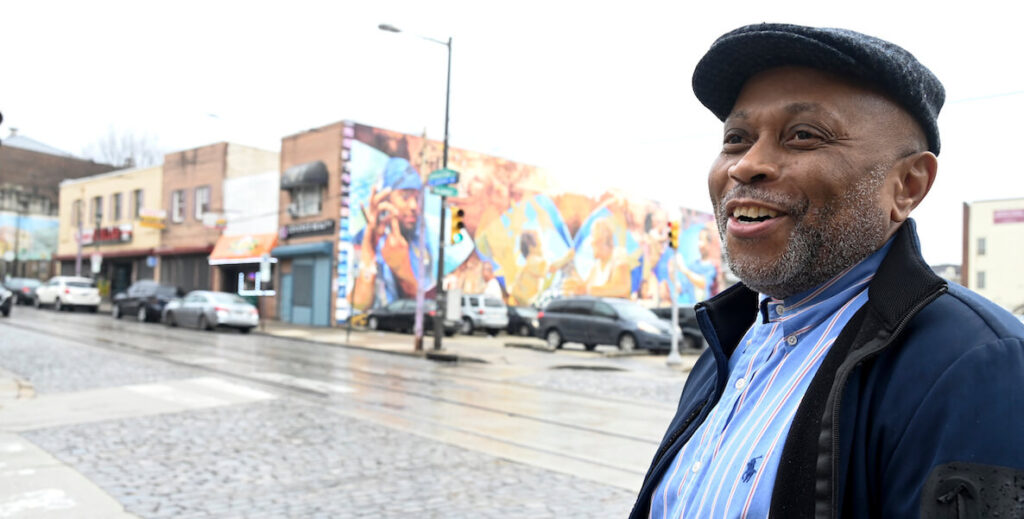I grew up in North Philadelphia, in the projects. As a young man, I was influenced by street life: gambling, hustling, becoming a street “illegal pharmaceutical representative.” That lifestyle led to me being shot four times, and barely surviving.
Three of my cousins were murdered by guns. When I was 19, my younger brother was murdered. I spent 23½ years in prison, including time in solitary confinement, accused of taking the life of the person responsible for my brother’s death. During that time, I got my GED and my bachelor’s degree. After spending more than two decades in prison, I received a new trial, was found not guilty, and had my life sentence overturned.
Since then, I have earned two master’s degrees and helped launch several nonprofit organizations. Throughout my activism, I have worked for the School District of Philadelphia as a Parent Coordinator, working in schools throughout the city to support the guardians of our young people.
I believe strongly that we must — and we can — change our city’s gun violence culture.
As a lifelong Philadelphian, a survivor of gun violence, a public servant, a father, and someone who has lost too many people I care about to gun violence, I believe strongly that we must — and we can — change our city’s gun violence culture.
But we have to stop trying the same things that don’t work and expecting different outcomes.
Instead, here are five ways I believe we can really put an end to gun violence now and in the future:
1. We need community hubs — in every neighborhood — that serve the needs of the people who live there.
The City, with the support of philanthropists and the private sector, would be wise to build high-quality, welcoming community spaces where folks can come to get a range of support: job opportunities and training; food; mental health care; childcare; and so on. There are a handful of places and programs attempting to do this work, but they are uncoordinated efforts in a limited number of neighborhoods. The key to enabling these hubs to have a real impact would be to start by asking members of the community in which they’re located what they actually need. Too often we see organizations come into neighborhoods with their own agenda, not paying attention to what folks really need. Then they wonder why they’re not getting the outcomes they desired.
2. We need to connect neighbors.
Neighbors today don’t know each other. Or they’re scared of each other. When I leave my house at 5:30 in the morning for work, I see a woman walking in the middle of the street, too scared to walk on the sidewalk for fear she’ll be jumped. I greet her and everyone else with a friendly, “Good morning! How are you?” but I know I am the exception.
We have come to distrust the people who live around us. Groups of young Black men, especially, bear this bias, and I understand why they seem “scary” to some folks. But because I am not afraid — because I have seen that no matter how “scary” someone seems on the street, they are all the same once they get to prison without their guns — I often approach groups of men and get them talking.
I shouldn’t have had to go to prison to get my GED and my bachelor’s degree.
Almost every time I find out that they would welcome the chance to work. Or they’d like to meet the neighbor who seems scared of them. But we need safe, inviting spaces and community events to bring people together. I truly believe that building community will change our city dramatically.
3. We need to better evaluate applicants for “violence prevention funding.”
Time and again we see how large sums of money are given to well-meaning organizations that don’t prove they’re having an actual measurable impact on the people they claim to serve. This is a disservice to communities, a waste of money, and an insult to grassroots leaders who are doing the work, but may not have the know-how when it comes to applying for grants and networking. We need better reviews of our violence prevention programs, better monitoring, and higher standards to hold them accountable.
4. We need more partners — and programs — in our schools.
I know firsthand that prisons are quick to bring in all kinds of partners — religious groups, arts groups, animal groups. But I shouldn’t have had to go to prison to get my GED and my bachelor’s degree. Our schools should be our city’s greatest resource. And we need to be teaching students life skills they can bring back into the communities from which they come. Social skills. Problem-solving skills. Job searching and workplace behavior. Money management. Conflict resolution.
5. We need to invest in young children.
You would not believe some of the stories I hear in my work every day, about children as young as 10 threatening gun violence. You also wouldn’t believe how many young people I’ve met through my work in schools who have subsequently been murdered. I know there is research demonstrating that immediate gun violence prevention should focus on older, known, “high-risk” individuals — but a lifetime of professional and personal experience has shown me that we need to go the other direction, too, and start building skills with our youngest kids — before it’s, once again, simply too late.
The Citizen welcomes guest commentary from community members who stipulate to the best of their ability that it is fact-based and non-defamatory.
This piece is supported by the Credible Messenger Reporting Project, an initiative of the Philadelphia Center for Gun Violence Reporting.

